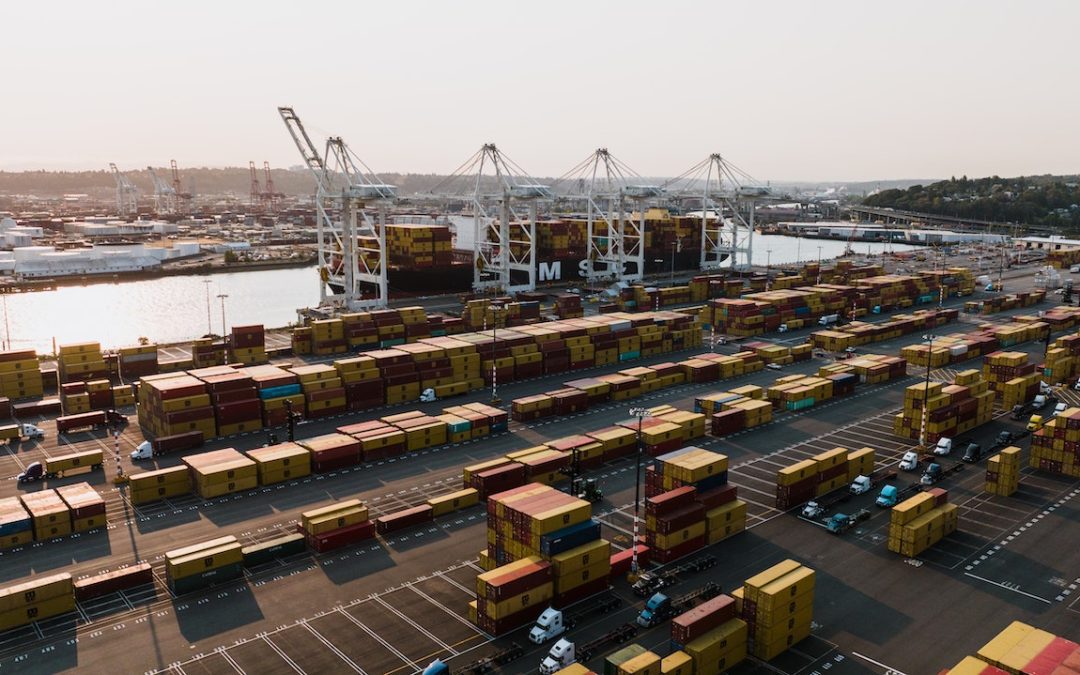There are so many acronyms that go with freight – PVA, EORI, FAS, FOB – it’s like another language!
THC is another to add to your freight shipping dictionary. It stands for Terminal Handling Charges, and here we tell you what that refers to…
What Are Terminal Handling Charges?
Terminals are to ports as gates are to airports.
A terminal is a dedicated location at a seaport for container vessels to dock and load or unload goods or people. A port will have multiple terminals, each assigned to handling different categories of goods.
Terminal Handling Charges, or THC, are fees charged by commercial terminal operators to shippers for everything that happens at the port. This includes transporting the containers from the seller’s vehicle to the stack, and on again to the vessel, and vice versa at the destination.
THC covers services the terminal provides, such as:
- Handling and moving containers around the terminal
- Storing containers
- Providing equipment like cranes and forklift trucks
- Collecting customs duties and taxes
- Providing security.
THC varies from port to port, and from terminal to terminal, even within the same shipping line.
Are Terminal Handling Charges The Same As Wharfage?
In short, no. Wharfage is a separate port duty that shippers must pay to the port authorities for any vessel passing through the port, but it can be included within THC depending on the port.
A wharf is the actual bit of the port where a vessel is moored to be loaded or unloaded, and wharfage is charged purely for the time a vessel makes use of the wharf. It does not include any of the services that THC covers, such as handling, inspecting and sorting goods and containers.
Wharfage rates are usually set for the year and are calculated based on the weight of the cargo or its volume – whichever is greater.
How Much Are Terminal Handling Charges?
These days, freight terminals use lots of high-tech, expensive machinery to do lots of the jobs, and regular servicing is crucial to keep it all running efficiently.
THC circles back into the running of the terminal infrastructure. And they can be pretty hefty, especially for large shipments. In some cases, it’s up to 10% of the total shipping cost, and working out who’s paying what can make or break a shipping deal.
Factors that affect the cost of THC include:
Size And Weight Of Goods
Cargo that requires the use of specialist equipment due to its size and weight might bump up the THC.
Type Of Cargo
Reefer containers need to be hooked up to an electricity source and remain monitored, and hazardous goods require special handling and storage.
Where Do You Get Terminal Handling Charges?
THCs are payable at both the port of origin and destination, as well as any transhipment ports your cargo travels through.
For those in the back, transhipment refers to goods or containers being moved from one vessel to another whilst they’re travelling to their destination. This usually takes place when there isn’t a direct route from shipper to buyer. Think of it like connecting flights; if you want to get from London to China but there isn’t a direct flight, you could land in Frankfurt and board a second plane to take you the rest of the way.
Who Is Responsible For Paying THC?
Origin THC, or OTHC, and destination THC, or – you guessed it, DTHC – can be paid either directly by you, the buyer or by the shipping company you use. Who is liable to pay the charges depends on the terms of your deal.
The consignor and consignee decide who will pay what before shipping the goods, and these terms are laid out clearly in the Bill of Lading in the form of incoterms – internationally recognised trade codes that clearly state who is responsible for what. Sometimes it is mutually agreed that the consignor, or shipper, will pay the THC, but otherwise, it tends to be divided between shipper and buyer.
For example, if the contract says that the shipper will only pay the OTHC, then the buyer must make the payment of DTHC when the cargo reaches the destination port – or their warehouse if that’s what the terms state.
Transhipment THCs work differently. These are usually paid by the carrier who arranges the shipment. And that’s because when you use a freight forwarder, THC costs tend to be factored into the freight rates you are quoted to begin with.
What Can You Do To Lower THC?
Shipping charges stack up pretty quickly, and THC can feel extortionate, especially for shipments on the larger side. There are a few things that shippers can do to reduce their THC costs…
Consolidating Shipments
By reducing the number of containers you are shipping, you lessen the workload of the workers and use of the high-tech equipment that’s necessary to move your cargo around the ports.
Use A Freight Forwarder
Professional forwarders have established relationships with ports worldwide and might be able to negotiate lower THC rates on your behalf.
Anything Else?
Here are the main takeaways from this blog…
- THC rates can vary from terminal to terminal within a port.
- Rates can also change over time and are not fixed.
- Understanding the incoterms that apply to your shipment will clue you into who’s responsible for paying THC.
- You can’t get out of paying THC.
Terminal Handling Charges Are Unavoidable, But They Are Necessary
THC exist to cover the running of each terminal of a port; they mean workers get paid, and equipment can be maintained and kept in good working order.
Hopefully, our blog has given you a good idea of what terminal handling charges cover. For a refresh on Incoterms and what they’re all about, click here. And if you’re still struggling to get to grips with the ins and outs of the shipping world, contact Millennium for expert advice!

